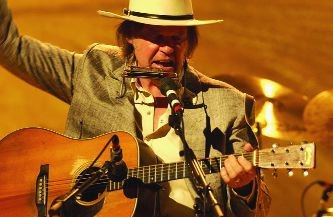Royal treatment

I never meant to burn any bridges,” Neil Young sings in “One of These Days” in Jonathan Demme’s movie Neil Young: Heart of Gold. “But I let some good things die.” Heart of Gold records Young’s two concerts at Nashville’s Ryman Auditorium last year. The concerts marked the debut performance of songs featured on his Prairie Wind album. Those songs make up roughly the first half of the program, which is filled out by Young favorites, including some that go back as far as his Buffalo Springfield days nearly four decades ago.
The movie represents Young’s attempt to reclaim those “good things”—to keep faith with the people he’s indebted to, professionally or emotionally.
It’s a profoundly affecting movie, full of melancholy and resilient good humor, aching loss and philosophical acceptance. Young and Demme dedicate it to Young’s father, who died a few months before the concert and whose sage, reassuring presence the singer strives to bring back from beyond the haze of dementia in the song “Prairie Wind”: “Tryin’ to remember what Daddy said / Before too much time took away his head.”
The film is haunted by other ghosts as well. There’s Danny Whitton of Crazy Horse, who died of a heroin overdose shortly after his addiction made him unfit to tour with Young and the band. It was to Whitton that Young dedicated “The Needle and the Damage Done,” which he reprises here. There’s Nicolette Larson, dead half a decade ago of cancer, whom Young invokes when he sings “Comes a Time,” on which she sang back-up vocals. There’s Lou, who managed the Manitoba ranch Young bought at 24 and whose bafflement at a hippie’s ability to buy such a magnificent expanse of land inspired Young to write “Old Man.” There’s Hank Williams, who played his last Nashville concert at Ryman, and one of whose guitars Young got hold of long ago and still plays—the subject of Prairie Wind’s most lyrical ballad, “This Old Guitar.” No one is forgotten, not even the hound dog named King, memorialized in “Old King” from the Harvest Moon album.
The movie is about the things that time takes away and about the remnants—hallowed, burnished, purified—it leaves behind. The tone is midway between tragic awe and gratitude. When Young sings the lyrics of “Old Man,” “Twenty-four and there’s so much more,” you can feel him looking back in irony and amazement at how a young man measured his distance from, and his bond with, an aging cowboy. When he sings about growing old in the search for a heart of gold, the words seem suddenly to have etched into truth. He refers to his 21-year-old daughter, returning to college, and before he launches into a song for her, “Here for You,” he comments with wistful humor that once he used to write love songs to girls his own age.
Except for the Jubilee Singers, whose young gospel voices accompany Young and his band on a few numbers, everyone on the Ryman stage is middle-aged or beyond. Some of the musicians are old companions of the road. Young’s wife, Pegi, and Diana DeWitt and Emmylou Harris provide heartfelt back-up; it’s especially touching to see how Harris mutes her harmonies so the focus stays on Young. And surely he has never sung more passionately—or been shot more lovingly than by Demme and cinematographer Ellen Kuras.
The concert begins with backdrops of the prairie and a homestead that look embroidered, quaint, but by the time Young has dug into his repertoire and his past something remarkable has occurred: his presence and that of his friends have inhabited the stylized set, like a spirit that’s brought a legend to life. At the end he’s left alone on the stage to sing “That Old Laughing Lady” from his first solo album. Unlike David Byrne, the rock singer featured in Demme’s movie Stop Making Sense, Young is devoid of artifice, especially in the final moment as he lays Hank Williams’s guitar lovingly in its case and saunters off stage.





